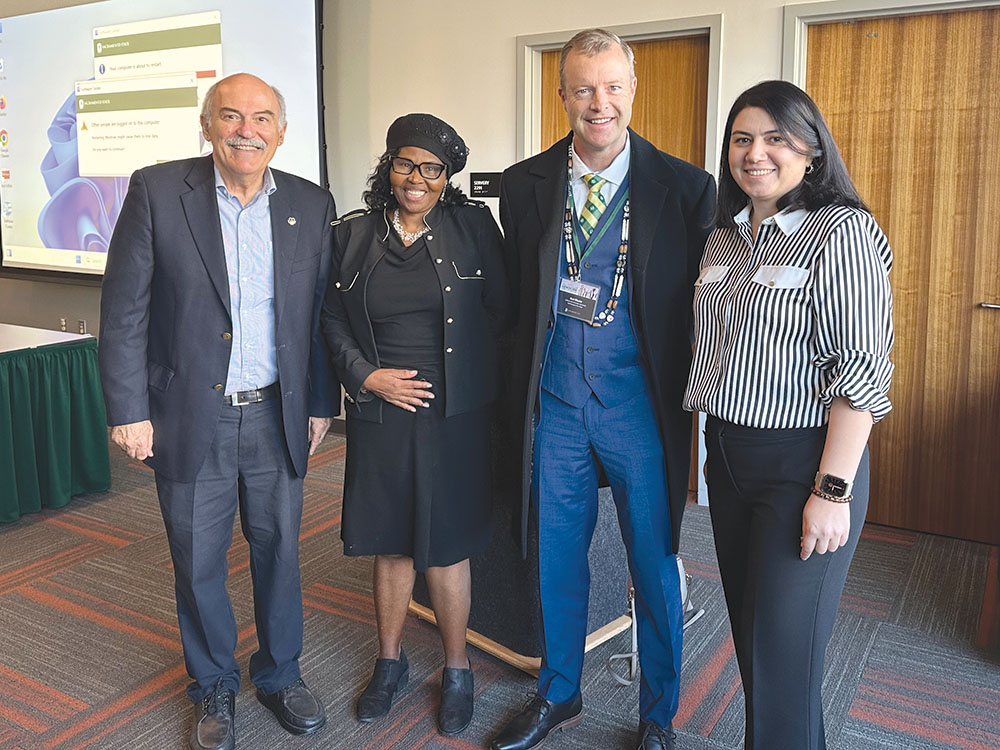Prof. Barlow Der Mugrdechian chaired a panel on “Remembering the Armenian Genocide” and gave a presentation on “The Armenian Genocide: Remembrance and Denial” at the 6th Annual International Conference on Genocide, held at Sacramento State University, November 14-16, 2024.
The theme of the Conference was “Dimensions of Genocide: Persistence, Denial, Resistance and Justice,” and attracted a large number of academics from throughout the world. The goal of the conference, was “to identify strategies and resources for the end of genocidal practices across the globe through a close examination of these dimensions of Genocide.” These could include but are not limited to resistance, pathways to restorative and transformative justice, reparation, reconciliation, healing, and divestment.
Professor Raghu Trichor, Department of Anthropology, and Dr. Mark Wheeler, Senior Advisor to Sacramento State University President J. Luke Wood, co-chaired the Programming Committee for the 6th Inter-national Conference.
The Armenian Studies Program at Fresno State was a co-sponsor of the International Conference. Prof. Der Mugrdechian chaired the panel, held on Friday, November 15, which featured four presentations: Der Mugrdechian (Armenian Studies Program), on “The Armenian Genocide: Remembrance and Denial”; Simon Maghakyan (Fresno State and the Univ. of Oxford) “‘Non-Existing Sites Cannot Be Destroyed’: Understanding Cultural Genocide Through Power Legitimation”; Diana Hayrapetyan (Clark University), “Returning ‘Home’: Case Study of Armenian Returnees”; and Tehmine Martoyan (Armenian Genocide Museum-Institute Foundation) “Continuation of a Genocidal Policy: Annihilation of the Greeks and the Armenians in Smyrna According to the Documents of the National Archives of Armenia.”
Prof. Der Mugrdechian, Berberian Coordinator of the Armenian Studies Program, prsented a two-part power-point. The first section was a historical overview of the Armenian Genocide and the second section focused on how denial developed in Ottoman Turkey and the modern Republic of Turkey, from 1918 until today.
Der Mugrdechian explained that there were five chronological periods of denial:
1918-1923-from the end of World War I to the Treaty of Lausanne and the establishment of the Republic of Turkey; 1923-1938-the Republic of Turkey under Kemal Ataturk; Turkey from 1938-1975-WWII including the beginning of the Cold War, Turkey’s admittance into NATO, and Turkey’s signing of the UN Genocide Convention; 1975-2003-the beginning of the active phase of the denial of Genocide by the Republic of Turkey; and the period from 2003 until today-Turkey under Prime Minister and later President, Recep Tayyip Erdoğan.
Dr. Simon Maghakyan is a political scientist who researches heritage and security.
Dr. Maghakyan is the 20th Kazan Visiting Professor in Armenian Studies at Fresno State and a Postdoctoral Fellow at the University of Oxford.
His presentation was on Azerbaijan’s systematic destruction of Armenian heritage in Nakhichevan between 1997 and 2006 and an analysis of the real or imagined security concerns, which rarely culminate in such complete ‘cultural genocide.’
The presentation sought to propose a more comprehensive explanation for the cultural genocide in Nakhichevan.
Diana Hayrapetyan, a PhD Candidate in History at the Strassler Center for Holocaust and Genocide Studies, Clark University, discussed the issue of Armenian repatriation following the 1918 Armistice in the Ottoman Empire.
Despite the Armistice terms not offering explicit assurances of peace or reconciliation, the overall atmosphere in the Ottoman State was viewed as a chance for dispersed Armenian survivors to contemplate a return to their “home.”
However, the diverse facets of return have not been thoroughly examined, leading to significant debate about circumstances, in which return might be more favorable compared to local integration or resettlement in a third country.
Tehmineh Martoyan is a specialist in International Relations/Oriental Studies (Iran-ology), a specialist in Genocide Studies, and a senior researcher at the Armenian Genocide Victims’ and Survivors’ Documentation and Research Department, Armenian Genocide Museum-Institute Foundation, in Yerevan.
Martoyan presented her research based on unpublished and yet uncirculated documents that refer to the annihilation of Smyrna’s Christian population, Armenians and Greeks, and the arson of their neighborhoods in 1922.
In her paper, Martoyan aimed to bring to light the knowledge of the deportations of Armenians and Greeks, the motives behind the arson of the city, the killings, and the overall process of annihilation of Armenians and Greeks.
The 6th International Conference on Genocide at Sacramento State is one of the largest gatherings on genocide studies in the United States, and featured presentations and examples of genocide throughout the world.




